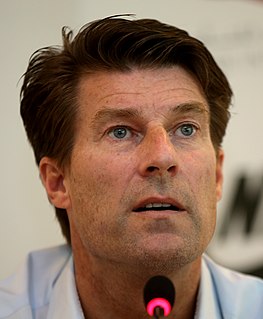A Quote by Martin Zwilling
Entrepreneurs are perennially short on cash, so they tend to hire less expensive and less experienced team members. Yet most founders are overworked, so they have no time and budget for coaching and training. Team members not confident in their roles lose motivation quickly.
Related Quotes
Teams use trust as currency. If it is in short supply, then the team is poor. If trust abounds, the members of the team have purchase power with each other to access each others’ gifts, talents, energy, creativity, and love. The development of trust then becomes a significant leadership strategy. Trust creates the load limits on the relationship bridges among team members
If we write our laws and design them around the most privileged members of society, i.e., billionaire football team owner, then we forget about the people who don't have the same resources to make an appeal, to fight a wrongful accusation. Those tend to be members of the LGBT community and people of color because those are the people who tend to engage in the work of reappropriation to subvert discrimination. And yet those are the same ones being denied, based on their own identities.
Hot groups have members who are task-obsessed and full of passion. They share a style which is "intense, sharply focused, and full bore. Members feel engaged in an important, even vital and personally ennobling mission; their task dominates all other considerations; and although such intense teams tend to remain intact only for a relatively short period of time, that time is remembered nostalgically and in considerable detail by its members.
When team members openly and passionately share their opinions about a decision, they don't wonder whether anyone is holding back. Then, when the leader has to step in and make a decision because there is no easy consensus, team members will accept that decision because they know that their ideas were heard and considered.





























